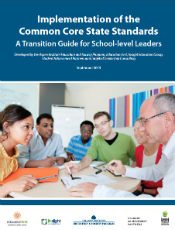The Aspen Institute, together with Education First, Insight Education Group, Student Achievement Partners and Targeted Leadership Consulting, have released "Implementation of the CCSS: A Transition Guide for School-Level Leaders."
The guide provides specific steps and tools for successful transition to the new standards at the school level.
- High-Impact Actions: Critical moves that the leadership team and other stakeholders should take to implement the indicator in their school.
- Measures: Examples of ways to collect and analyze data to assess the implementation of each indicator.
- Tools: Links to supporting materials that will help the leadership team and other stakeholders address the indicator.
The guide also includes vignettes with discussion questions to encourage further exploration of the indicators among leadership team members and other school community members.
In addition, The Aspen Institute also released several new modules in its Tools for Teachers series, including:
- Implementing the CCSS: The Role of ILTs and LASW
- Close Reading and Text-Dependent Questions
- Designing Close Reading Instruction
- Engaging in Academic Writing
- Text Complexity and the CCSS
@InsightEdGroup & @drmichaelmoody





